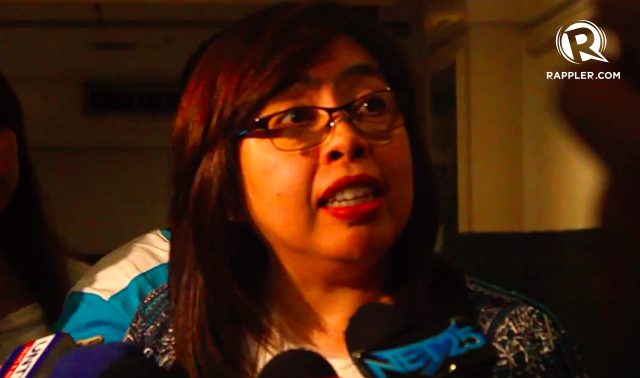SUMMARY
This is AI generated summarization, which may have errors. For context, always refer to the full article.

MANILA, Philippines (UPDATED) – Commission on Human Rights (CHR) Commissioner Gwen Pimentel-Gana on Monday, March 27, said there is no evidence to say extrajudicial killings in the war on drugs are state-sponsored.
No such government policy exists, she added.
“Hindi naman kami puwedeng gumawa ng conclusion na ganyan kasi CHR kami (We cannot make that conclusion because we are the CHR),” she told reporters during a forum entitled “Panaghoy: A gendered and child perspective on EJKs.”
“Because honestly, in a state-sponsored killing, there is a policy, na sinabi ng estado na ganito ang aming policy, pagpapatayin na lang at hindi na iimbestigahan (the state says that this is our policy, we will just kill and not investigate).”
She added that it is also unfair to arrive at that conclusion because of the number of cases – 490 as of last week of March – the commission has so far investigated.
As of March 26, 2017, there have been over 7,000 deaths, both from legitimate police operations and vigilante-style or unexplained killings. (READ: IN NUMBERS: The Philippines’ ‘war on drugs’)
President Rodrigo Duterte’s pronouncements “encouraging” the police force, and even the public, to take matters into their own hands and kill drug personalities are not enough to directly link him to the killings.
“You have to show a direct causation to what happened,” Gana explained. “Kung sasabihin mo pulis ang pumatay kasi nanlaban and nakita natin na hindi naman nanlaban at plinant lang, so EJK iyon pero masasabi mo ba na inutos iyon ni Duterte kasi sinabi niya na patayin mo iyon lahat-lahat? Siya ba iyon, pinatay ba niya iyon?”
(If we said that a policeman killed a drug personality because he allegedly fought back yet we saw that he really did not, and the police just planted evidence, can we say that, that was ordered by Duterte? Did he kill the man?)
‘Lots of motivation’
Gana, who heads the CHR task force on extrajudicial killings, said “a lot of motivation can come in” behind the rise of killings in the drug war.
“That policeman must be a scalawag or probably he was in the drug trade and wanted to kill his asset,” she explained. “There are so many things and me, as CHR commissioner, I cannot just randomly say [it’s state-sponsored] just because Duterte said so. What kind of an investigator am I or a lawyer? What is the basis?”
International human rights organizations – such as Human Rights Watch (HRW) and Amnesty International (AI) – have tagged the Philippine National Police (PNP) as being behind the killings.
Gana said the CHR cannot conclude the same because “we cannot just condemn anybody.”
“You’re actually condemning the whole institution of the police if you say that it’s them and I believe there are a lot of good people in the police,” she explained. “These rotten eggs are just there and unless you can show that, you cannot conclude that the killings are state-sponsored.”
This does not mean that the CHR is not working to hold responsible those involved in anomalous operations that resulted in unjust killings – especially if there is a nationwide pattern. According to Gana, the commission is working closely with stakeholders such as the PNP.
Lawyer Arpee Santiago of the Ateneo Human Rights Center, however, said that if one looks at “literal interpretation,” there will really be no state admission of extrajudicial killings.
“Look at the environment,” he told Rappler on Tuesday, March 28. “So if you would look at [the] pronouncements of those in power, Duterte has been consistent. The alter-egos of the President in the Cabinet have also been saying that they will protect police officers who will be in hot water.”
Meanwhile, lawyer Rommel Bagares of Centerlaw said Duterte may also be held liable through command responsibility “if it is shown that PNP officers did all that and the state did nothing to investigate and prosecute when they ought to have known about it by reason of their position.”
Different method
But while killings are not yet determined to be state-sponsored, Gana acknowledged that there is still a better way to carry out Duterte’s intense war on drugs.
“He has to realize that may mali naman yata sa procedure, sa pamamaraan mo, bakit maraming inosenteng namamatay?” she said. “Hindi naman puwede iyon, sana ibang way naman.”
(He has to realize that there is something wrong in the existing procedures and ways that his campaign is being carried out. Why are there a lot of innocent people getting killed? That’s not right. There is another way.)
Duterte, however, has insisted that he will be relentless. On March 2, he said that there will be more killings and his campaign will not end “as long as there is drug pusher and a drug lord.” (READ: Duterte on war on drugs: ‘More killings to come’) – Rappler.com
Add a comment
How does this make you feel?
There are no comments yet. Add your comment to start the conversation.